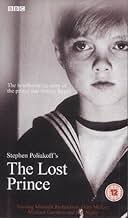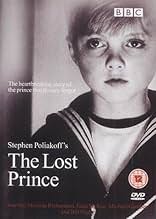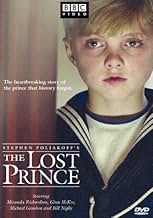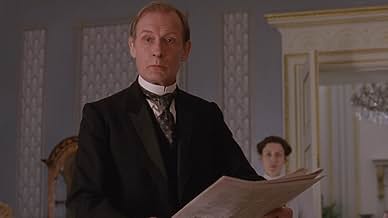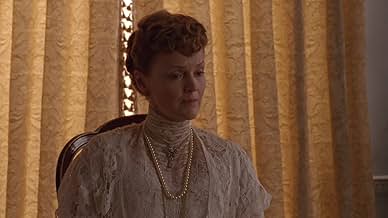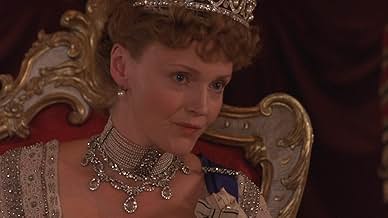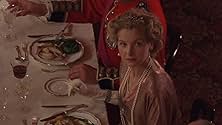AVALIAÇÃO DA IMDb
7,6/10
2,2 mil
SUA AVALIAÇÃO
Adicionar um enredo no seu idiomaThe story of Prince John, the autistic and epileptic youngest son of Queen Mary and King George V, who spent his whole life hidden away from public view and died at the age of 13 in 1919.The story of Prince John, the autistic and epileptic youngest son of Queen Mary and King George V, who spent his whole life hidden away from public view and died at the age of 13 in 1919.The story of Prince John, the autistic and epileptic youngest son of Queen Mary and King George V, who spent his whole life hidden away from public view and died at the age of 13 in 1919.
- Ganhou 3 Primetime Emmys
- 8 vitórias e 21 indicações no total
Explorar episódios
Avaliações em destaque
This short drama focused on the epileptic Prince John, son of George V and Queen Mary, and brother to the present Queen Elizabeth's father, George VI.
We see the story of John from the perspectives of himself and of his nurse, Lalla (the emotionless Gina McKee). As he becomes more out of control and an embarrassment to his family, the little boy becomes more special to the viewer. Johnny is a crank but a lovable one.
Daniel Williams and Matthew Thomas both make an impact as Prince John at different ages, while Tom Hollander and Miranda Richardson are excellent as his repressed and bewildered parents. There's also key roles of interest for Bill Nighy (Stamfordham), Frank Finlay (the PM, Herbert Asquith), and David Barrass (Kaiser Bill).
Aside from the problems accorded by John's illness and confinement, we also see how events unfold in Russia for George V's cousins, the ill-fated Romanov family.
'The Lost Prince' is another winner for writer/director Stephen Poliakoff, and well worth your time. Enjoyable whether you know the story or the intricacies of the Royal family, or not.
We see the story of John from the perspectives of himself and of his nurse, Lalla (the emotionless Gina McKee). As he becomes more out of control and an embarrassment to his family, the little boy becomes more special to the viewer. Johnny is a crank but a lovable one.
Daniel Williams and Matthew Thomas both make an impact as Prince John at different ages, while Tom Hollander and Miranda Richardson are excellent as his repressed and bewildered parents. There's also key roles of interest for Bill Nighy (Stamfordham), Frank Finlay (the PM, Herbert Asquith), and David Barrass (Kaiser Bill).
Aside from the problems accorded by John's illness and confinement, we also see how events unfold in Russia for George V's cousins, the ill-fated Romanov family.
'The Lost Prince' is another winner for writer/director Stephen Poliakoff, and well worth your time. Enjoyable whether you know the story or the intricacies of the Royal family, or not.
This is a truly wonderful production with brilliant, almost surreal touches that lift this drama about the crowd.
I would love to know if any of Prince John's drawings survived. They had, or at least the ones used for the film had a Chagal-like quality that was both very graceful and artistic and filled with insite as to the inner character of the subjects. "The Tsar Swimming" and "Fat Mary" are two example. His father wearing a crown far too big for his head is a masterpiece.
I also wonder if Prince John wasn't a savant. His drawings were exceptional and far ahead of his time and his musical ability was,(if the film properly portrayed this talent)quite remarkable.
What is wonderful about this film is the sense that John despite everything managed to form his own little community on his "Estate", surrounded by people who really did love him. I also have the feeling that he was quite a happy child most of the time.
His parents were no worse than other Royal parents and a great deal better than most.
Special mention should be made of the marvelous Bibi Anderson who played Queen Alexandra so perfectly. At the funeral she even managed to look almost exactly like the Dowager Queen.
Someone mentioned that they didn't believe that the Tsar and the Tsarina would have acted as coldly toward their relations when visiting at Cowes. Unfortunately, that's just how they acted. They did believe that they were seated higher at the table of the Rulers of the World than their cousins in England who had to make-do with smaller versions of their own vast palaces in St. Petersburg. After all the Tsar was the last Absolute Monarch in the world. He even had to approve of every marriage and every divorce. No decision could be made unless he gave his approval. His cousin George had to actually deal with a rabble of advisors and that intrusive Parliment.
The scenes of the Tsar swimming were especially out of touch with reality, just as the Tsar was out of touch with the reality of his situation.
The Russian Grand Duchesses were so dream-like in their lovely summer laces and huge flower-like hats. All of John's imagined scenerios were touched with this combination of wistfullness and joy.
I mention these things because they haven't been mentioned before and they are what I will bring with me forever. Those haunting images of the children running on the beach, the flower-hats in the flower-garden and John peeking through the rails of the balcony at the beautiful lady at the banquet who smiles and waves back at him...a small and precious moment to be treasured.
See this film and fall in love with a child that refuses to be "Lost".
I would love to know if any of Prince John's drawings survived. They had, or at least the ones used for the film had a Chagal-like quality that was both very graceful and artistic and filled with insite as to the inner character of the subjects. "The Tsar Swimming" and "Fat Mary" are two example. His father wearing a crown far too big for his head is a masterpiece.
I also wonder if Prince John wasn't a savant. His drawings were exceptional and far ahead of his time and his musical ability was,(if the film properly portrayed this talent)quite remarkable.
What is wonderful about this film is the sense that John despite everything managed to form his own little community on his "Estate", surrounded by people who really did love him. I also have the feeling that he was quite a happy child most of the time.
His parents were no worse than other Royal parents and a great deal better than most.
Special mention should be made of the marvelous Bibi Anderson who played Queen Alexandra so perfectly. At the funeral she even managed to look almost exactly like the Dowager Queen.
Someone mentioned that they didn't believe that the Tsar and the Tsarina would have acted as coldly toward their relations when visiting at Cowes. Unfortunately, that's just how they acted. They did believe that they were seated higher at the table of the Rulers of the World than their cousins in England who had to make-do with smaller versions of their own vast palaces in St. Petersburg. After all the Tsar was the last Absolute Monarch in the world. He even had to approve of every marriage and every divorce. No decision could be made unless he gave his approval. His cousin George had to actually deal with a rabble of advisors and that intrusive Parliment.
The scenes of the Tsar swimming were especially out of touch with reality, just as the Tsar was out of touch with the reality of his situation.
The Russian Grand Duchesses were so dream-like in their lovely summer laces and huge flower-like hats. All of John's imagined scenerios were touched with this combination of wistfullness and joy.
I mention these things because they haven't been mentioned before and they are what I will bring with me forever. Those haunting images of the children running on the beach, the flower-hats in the flower-garden and John peeking through the rails of the balcony at the beautiful lady at the banquet who smiles and waves back at him...a small and precious moment to be treasured.
See this film and fall in love with a child that refuses to be "Lost".
BBC1's 'The Lost Prince' is one of the best television dramas that the channel has shown for a long time. The story of King George V's youngest son, Johnnie, the programme explores the boy's learning difficulties and his autism-related problems, as well as the horrors of war as seen through the eyes of the Royal family.
Those are the facts, but the drama is so much more than a re-telling of a royal story. Moments of poignancy, such as Johnnie's frank but heartbreaking honesty with his parents, are touching without becoming schmaltzy or obvious, and the harsh burden of the First World War on the British keeps the drama well within reality.
Good performances all around, particularly from Miranda Richardson as Queen Mary and Tom Hollander as King George, who invoke sympathy from their seemingly impassive facades. Bill Nighy is excellent as the King's adviser, Stamfordham, and the children - especially Rollo Weeks -are more than capable of carrying such a difficult and weighty subject.
Those are the facts, but the drama is so much more than a re-telling of a royal story. Moments of poignancy, such as Johnnie's frank but heartbreaking honesty with his parents, are touching without becoming schmaltzy or obvious, and the harsh burden of the First World War on the British keeps the drama well within reality.
Good performances all around, particularly from Miranda Richardson as Queen Mary and Tom Hollander as King George, who invoke sympathy from their seemingly impassive facades. Bill Nighy is excellent as the King's adviser, Stamfordham, and the children - especially Rollo Weeks -are more than capable of carrying such a difficult and weighty subject.
(Aired over two nights this week on the Canadian station, CBUT, which we get here in Seattle...)
Superbly photographed and exquisitely acted, this movie primarily focuses on England's Prince John, youngest son of George V and Queen Mary who, in his tragically short life, suffered not only from periodic epileptic seizures but was also handicapped by what appeared to be some form of retarded mental development.
The creators of this film were kindly and charitable in not showing the boy's ailments in too negative a light. Enough was shown though to give the viewer to understand that the poor lad had problems - so much so that his immediate family and caretakers felt that he clearly wasn't cut out for royal service. As a result he was whisked away to a sort of royal "nether-world" out in the English countryside, away from public view, where hopefully he would not become an object of curiosity, scorn, ridicule, etc.
Sad though the plight of the boy was, you couldn't help but feel that he and his dysfunctional condition was a metaphor for the plight of the entire royal or aristocratic system which held sway over most all of Europe at the time. The boy's ailments and weaknesses eventually lead to his downfall, and all of this plays out simultaneously with the royal families of Europe (most of whom are shown being connected through marriage or bloodline) attempting to cope quite ineffectually with the onslaught of the tragedy of World War One.
The film includes several scenes of interaction between the British royal family and the Russian royal family (the Czar and Czarina and their wonderful kids). They are closely related, which makes their death (or shall we say murder, at the hands of the Bolsheviks, which is graphically depicted) all the more chilling, tragic and thought provoking.
There is so much to contemplate in this movie that I'd rather not sit here and prattle on about it, but instead would rather simply recommend that people go rent a copy and just watch it. It may not be for everyone, as it is a bit long and covers many facets of early 20th century history that will glide right over your head if you weren't paying attention in history class. But even if you ignore entirely the historical aspects of the movie, it is nonetheless a very touching picture: sad, compelling, and ultimately life-affirming, with wonderful performances and beautifully photographed images that will stick in your mind for a long time to come.
Superbly photographed and exquisitely acted, this movie primarily focuses on England's Prince John, youngest son of George V and Queen Mary who, in his tragically short life, suffered not only from periodic epileptic seizures but was also handicapped by what appeared to be some form of retarded mental development.
The creators of this film were kindly and charitable in not showing the boy's ailments in too negative a light. Enough was shown though to give the viewer to understand that the poor lad had problems - so much so that his immediate family and caretakers felt that he clearly wasn't cut out for royal service. As a result he was whisked away to a sort of royal "nether-world" out in the English countryside, away from public view, where hopefully he would not become an object of curiosity, scorn, ridicule, etc.
Sad though the plight of the boy was, you couldn't help but feel that he and his dysfunctional condition was a metaphor for the plight of the entire royal or aristocratic system which held sway over most all of Europe at the time. The boy's ailments and weaknesses eventually lead to his downfall, and all of this plays out simultaneously with the royal families of Europe (most of whom are shown being connected through marriage or bloodline) attempting to cope quite ineffectually with the onslaught of the tragedy of World War One.
The film includes several scenes of interaction between the British royal family and the Russian royal family (the Czar and Czarina and their wonderful kids). They are closely related, which makes their death (or shall we say murder, at the hands of the Bolsheviks, which is graphically depicted) all the more chilling, tragic and thought provoking.
There is so much to contemplate in this movie that I'd rather not sit here and prattle on about it, but instead would rather simply recommend that people go rent a copy and just watch it. It may not be for everyone, as it is a bit long and covers many facets of early 20th century history that will glide right over your head if you weren't paying attention in history class. But even if you ignore entirely the historical aspects of the movie, it is nonetheless a very touching picture: sad, compelling, and ultimately life-affirming, with wonderful performances and beautifully photographed images that will stick in your mind for a long time to come.
This lavish production, uses the vehicle of the short life "The Lost (from history) Prince" to portray what Royal Life was like at the turn of century. The sumptuous production illustrates the splendour, luxury, misery and ultimately the futility of the Royals. There are wonderful images of the beautiful daughters of the tsar. Epileptic Prince John is however seen as the only one as being allowed to be himself. Wonderful performances of the roles of the ice queen Queen Mary, Lalla the nursemaid, Prince John young and old.Has been criticised for being too long, but you must try and get to see this when it comes to your country.
Historical facts, Prince John died aged 14 isolated from his family in a farmhouse at Sandringham? cared for by Lalla Bill. Only one historical reference to him still existed. The height of George V is still a secret.
Historical facts, Prince John died aged 14 isolated from his family in a farmhouse at Sandringham? cared for by Lalla Bill. Only one historical reference to him still existed. The height of George V is still a secret.
Você sabia?
- CuriosidadesKing George V had six children, two of whom used the name George. His second son was Prince Albert Frederick Arthur George, known to the family as Bertie, who became King George VI. He had a bad stutter that began in early childhood and lasted into adulthood. His third son, Johnnie's closest sibling in this movie, was Prince George, Duke of Kent. He grew up to live a life that was considered scandalous, and died in a plane crash in 1942.
- Erros de gravaçãoWhen the Romanovs are in England, Alexandra speaks English with a Russian accent. In real life, Alexandra was a German princess raised in England by her grandmother, Queen Victoria. She spoke English with a British accent.
- Citações
Prince George: [Speaking about Prince John] He was the only one of us who was able to be himself.
- ConexõesFeatured in Masterpiece Theatre: The Lost Prince: Part 1 (2004)
- Trilhas sonorasRondo for Glass Armonica
(uncredited)
Composed by Joseph Schmittbauer (as J.A. Schmittbauer)
(Queen Alexandra's birthday cake)
Principais escolhas
Faça login para avaliar e ver a lista de recomendações personalizadas
Detalhes
- Data de lançamento
- Países de origem
- Centrais de atendimento oficiais
- Idioma
- Também conhecido como
- 失落的王子
- Locações de filme
- Black Park Country Park, Black Park Road, Wexham, Buckinghamshire, Inglaterra, Reino Unido(Russian lake, royal car)
- Empresas de produção
- Consulte mais créditos da empresa na IMDbPro
Contribua para esta página
Sugerir uma alteração ou adicionar conteúdo ausente

